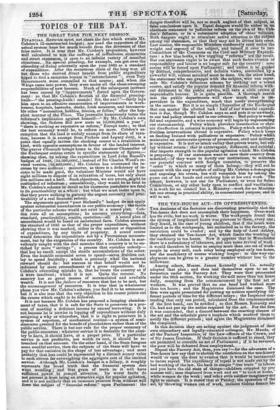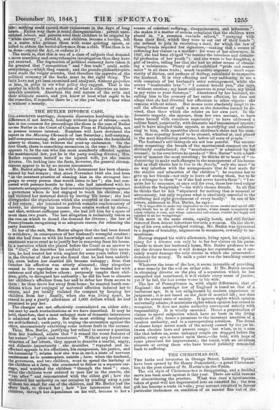THE TEN-HOURS ACT—ITS OPPRESSIVENESS. THE denizens of the factories are
discovering practically that the Ten-hours Act does not accomplish their happiness. Over-work has its evils, but no-work is worse. The workpeople found that the system of lengthened hours was grievous to them, every one; they found, in the case of young children, that if the hours were limited as to the workpeople, but unlimited as to the factory, the restriction could be evaded ; and by the help of Lord Ashley, they obtained the Ten-hours Act, which limits the working of the machinery to ten hours. Now it appears that in Manchester there is a redundancy of labourers, and also some revival of work : it would therefore be better to employ more than one set of work- people in every mill, each relay being employed only ten hours, but the machinery of course working longer: in this way em- ployment can be given to a greater number without loss to the millowner.
Among others, Messrs. James Kennedy and Co. actually adopted that plan ; and thus laid themselves open to an in- formation under the Factory Act. They were first prosecuted under the 26th section, for working the mill more than ten hours daily, counting from the commencement by the first set of workers. It was proved that no one hand had worked more than ten hours ; and the Magistrates dismissed the case. The firm were again prosecuted for putting up notices specifying dif- ferent periods of time for the different relays ; the Inspector con- tending that only one period, calculated from the commencement of the first hand,: can be notified ; so that Messrs. Kennedy and Co. had not put up the notice required by the act. For the firm it was contended, that a discord between the enacting clauses of the act and the schedule gave a loophole which enabled them to notify the different periods ; and again the Magistrates dismissed the complaint. In this decision they are acting against the judgment of their own stipendiary and legally-educated colleague, Mr. Maude, of all the Factory Inspectors, of the Law-officers of the Crown, and of Sir James Graham. If their decision is suffered to stand, they are permitted to override an act of Parliament ; if it be reversed, the poor will be debarred from employment.
Repeal the Factory Act, then, you cry ?—for the advocates of a Ten-hours law say that to abolish the restriction on the machinery would so open the door to evasion that it would be tantamount to entire repeal: The expediency of repeal is not made out by the bad working of the law. Go back to simple " free trade " in labour, and you have the old state of things—children crippled by pre- mature toil ; men displaced from work and set " to cook at home," while women do the work ; and other evils neither imaginary nor light to endure. It is stated that at Paisley, the operation of the act, by throwing women out of work, induces vicious female ha-
bits : nothing could exceed their viciousness in the days of long hours. Either way there is social disorganization : permit unre- stricted labour, and parents send their children to be crippled by "white slavery " ; forbid it, and children become a burden, left to a nurse who poisons them with some quieting opiate, or killed to obtain the burial-allowance from a club. What then is to be done—repeal the Act, or enforce it 2 The truth is, that this is one of a class of subjects that demand a more searching and comprehensive investigation than they have yet received. The dogmatists of political economy have taken it for granted that " cotnpetition " and " free trade" could settle everything,—which they cannot ; and the pseudo-philanthropists have made the vulgar mistake, that therefore the opposite of the political economy of the books must be the right thing. The facts have not yet been examined and analyzed, without prejudice or bias, in order to see what policy they suggest. 'That is the quarter in which to seek a solution of what is otherwise an inter- minable question. Ascertain the real nature of the evils and their ultimate causes, and you know at least what ought to be the remedies, if remedies there be ; or else you learn to bear what is without a remedy.



























 Previous page
Previous page